(完整word版)人教版八年级下册英语各单元重点短语.docx
(word完整版)人教版英语八年级下册重点词组、句型及语法点汇总,文档

英语八年级下册重点词组、句型及语法点汇总Unit 1 What ’s the matter?怎么了?一、重点词组1. have a fever / cough / cold 发热 /咳嗽 /感冒2.have a toothache / stomachache牙疼 /胃疼3.have a sore back / throat背疼 /喉咙痛4.talk too much 说得太多5.drink enough water 喝足够的水6.lie down 躺下7.drink hot tea with honey 喝加蜂蜜的热茶8.see a dentist 看牙医9.get an X-ray 拍 X 光片10.take one ’ s temperature量体温11.put some medicine on sth.在上面敷药12.all weekend 整个周末13.take breaks (=take a break)休息14.in the same way 以同样的方式15.go to a doctor=see a doctor看医生16.go along 沿着走17.shout for help 大声呼救18.without thinking twice 没有多想19.get off 下车20.have a heart problem 有意脏病21.to one ’ s surprise使惊讶的;22.expect sb to do 希望某人做某事23.wait for 等待24.agree to do 赞成做某事25.thanks to 多亏了;由于29.in time 及时30.save a/one’s life 挽救生命31.help others 帮助别人32.think about 考虑;认为33.right away 立刻;立刻34.get into trouble 造成麻烦〔或烦恼〕35.fall down 跌落36.mountain climbing 登山运动37.lose one’s life 失去生命38.(be) in a difficult situation 在困境中39.by oneself 由某人自己40.run out (of) 用完;耗尽41.cut off 切除42.climb down 爬下43.get out of 走开;从出来44.make a decision=make decisions做出决定45. be in control of掌管;管理47.take risks (take a risk) 冒险二、常有搭配1.too much 太多 1> 修饰不能数名词2> 修饰动词,表示程度too many 太多修饰可数名词复数much too 太修饰形容词或副词原级2.enough “足够的 /地〞 1> 修饰名词,常置前2> 修饰形容词或副词,常置后3.need to do 需要做某事4. without doing没有做某事5.see sb doing 看见某人正在做某事see sb do 看见某人做了某事6.24-year-old 形容词,作定语,放名词前24 years old 作表语,放 be 动词后7.be/get done 被动语态8.tell sb (not) to do sth 告诉某人〔不〕要做某事9.常有的感官动词: sound, feel, smell, look, taste 1> be 动词用法,后接形容词2> 主动表被动10.have trouble = have problems 做某事有问题=have difficulties + doing11.be interested in sth/doing 对(做)某事感兴趣12.be used to sth/doing sth 习惯于某事 /做某事used to do过去/从前做某事〔现在不〕use sth to do sth 使用去做某事13.because 后接原因状语从句because of 后接名词或 doing14.be ready to do 愿意 /准备好做某事15.so that 以便与;目的是,引导目的状语从句so that 这样以致于,引导结果状语从句16.keep on doing sth. 连续或坚持做某事17.give up doing 放弃做某事18.mind doing 介意做某事三、语法点1.咨询某人的健康问运及遇到麻烦的表达方法(1)咨询某人患了何种疾病或遇到了何种麻烦时,常用以下几种结构来表达:What’ s the matter (with sb. )?〔某人〕怎么了?What’ s wrong (with sb. )?〔某人〕怎么了? What’s the trouble (with sb.)?〔某人〕出什么事了?(2)要表达身体难过或不愉快,可用以下结构:①某人 +have/has+病症 /身体部位 +ache.②某人+have/has+a+sore+发病部位.③某人 +hurt(s)+身体部位或反身代词(oneself).④某部位 +hurt(s).⑤There is something wrong with one sb/’s+部位2.神情动词 should 的用法Should 为神情动词,意为“应该;应该〞,否认式为 shouldn ’t,此后接动词原形,无人称和数的变化。
(word完整版)人教版八年级下册英语单词表(带音标)

人教版八年级下英语单词Unit 1 What’s the matter?matte. [ˈmætə.v.重要, 要紧, 有关系What’s the matter? 怎么了?出什么事了?sor. [sɔ:(r).adj.疼痛的,酸痛的have a cold 感冒stomachach. ['stʌməkeɪk.n.胃痛, 腹痛have a stomachache 胃痛foot(复数feet. [fu:t.n.脚nec. [nek.n.颈, 脖子stomac. ['stʌmək.n.胃, 腹部throa. [θrəʊt.n.喉咙feve. ['fi:və.n.发烧, 发热li. [laɪ.v.躺,平躺lie down 躺下res. [rest.n.剩余部分, 其余;放松, 休息coug. [kɒf.n..v.咳嗽X-ra. ['eksreɪ.n.X光, X射线toothach. [ˈtu:θeɪk.n.牙痛take one's temperature 量体温headach. [ˈhedeɪk.n.头痛have a fever 发烧brea. [breɪk.n..v.休息, 暂停;打破take breaks (take a break)休息hur. [hə:t.v.伤害, 损害, 使受伤passenge. ['pæsɪndʒə.n.乘客, 旅客of. [ɒf.adv.prep.离开(某处);从…去掉get off 下车to one's surprise 使…惊讶, 出乎…意料ont. [ˈɒntə.prep.向, 朝troubl. [ˈtrʌbl.n.麻烦, 烦扰, 问题hi.[hit.v.(hit/hit)碰撞,打,打击right away 立即, 马上get into 陷入, 参与hersel. [hə:ˈself.pron.她自己, 她本身(she 的反身代词)bandag. ['bændɪdʒ.n..v.绷带;用绷带包扎press/pres/v.压;挤;按sic. [sɪk.adj.患病的, 不适的kne. [ni:.n.膝盖noseblee. [ˈnəʊzbli:d.n.鼻出血breath. [bri:ð.v.呼吸sunburne. [ˈsʌnbɜ:nd.adj.晒伤的ourselve. [ɑ:ˈselvz.pron.我们自己(we的反身代词)climbe. [ˈklaɪmə(r).n.登山者be used to 习惯于…适应于…ris. [rɪsk.n..v.风险, 危险;冒险take risks (take a risk) 冒险acciden. [ˈæksidənt.n.意外事件;事故situatio. [ˌsitjuˈeiʃən.n.状况, 形式, 情况kg=kilogra. [ˈkɪləgræm.n.公斤, 千克roc. [rɔk.n.岩石run out (of) 用尽, 耗尽knif. [naif.n.刀,餐刀cut off 切除bloo. [blʌd.n.血mea. [mi:n.v.意味着,意思是,意欲get out of 离开, 从…出来importanc. [ɪmˈpɔ:tns.n.重要性decisio. [dɪ'sɪʒn.n.决心, 决定, 抉择contro. [kən'trəʊl.v.控制,支配,操纵be in control of 掌管, 管理spiri. ['spɪrɪt.n.勇气, 意志deat. [deθ.n.死亡give up 放弃nurs. [nə:s.n.护士Unit 2 I’ll help to clean up the city parks.clean up 打扫(清除)干净chee. [tʃiə.v.欢呼cheer up 变得更高兴, 振奋起来give out 分发, 散发voluntee. [ˌvɔlənˈtiə.n..v.志愿者;义务做come up with 想出, 提出put off 推迟sig. [saɪn.n.标记, 符号, 标牌notic. [ˈnəʊtɪs.n..v.通知,公告;注意到hand out 分发call up 打电话给…某人, 征召used to 曾经…, 过去…lonel. ['ləʊnlɪ.adj.孤独的,寂寞的care for 照顾, 非常喜欢severa. [ˈsevrəl.prep.几个, 数个, 一些stron. [strɒŋ.adj.强壮的, 强烈的feelin. [ˈfi:lɪŋ.n.感觉, 感触satisfactio. [ˌsætɪs'fækʃn.n.满足, 满意jo. [dʒɔɪ.n.高兴, 愉快owne. [ˈəʊnə(r).n.所有者,物主try out 参加…选拔, 试用journe. ['dʒɜ:nɪ.n.(尤指长途)旅行, 行程rais. [reɪz.v.抬起,举起,筹集,征集midnight['midnait]n.午夜;子夜alon. [əˈləun.adv.独自, 单独repai. [riˈpɛə.v.修理, 修补fi. [fiks.v.修理,安装fix up 修理, 修补give away 赠送, 捐赠take after (外貌或行为)像broke. ['brəʊkən.adj.破损的, 残缺的whee. [wi:l.n..v.轮子, 车轮;旋转lette. [ˈletə.n.信件, 字母Mis. [mɪs.n.小姐set up 建立, 设立disable. [disˈeibld.adj.有残疾的,丧失能力的make a difference 影响, 有作用blin. [blaɪnd.adj.盲的, 盲目的, 失明的dea. [def.adj.聋的imagin. [ɪˈmædʒɪn.v.想象, 设想difficult. ['dɪfɪkəltɪ.n.困难ope. [ˈəʊpən.v.打开doo. [dɔ:.n.门carr. ['kærɪ.v.携带, 搬运trai. [treɪn.v.训练, 培养excite. [ɪkˈsaɪtɪd.adj.激动的, 兴奋的trainin. [ˈtreɪnɪŋ.n.训练, 培训kindnes. [ˈkaɪndnəs.n.仁慈, 善良, 亲切, 善意cleve. [ˈklevə.adj.聪明的, 机灵的understan. [ˌʌndəˈstænd.v.懂, 理解chang. [tʃeɪndʒ.n..v.改变interes. ['ɪntrəst.n..v.感兴趣;兴趣si. [sɜ:(r).n.先生mada. ['mædəm.n.夫人,女士Unit 3 Could you please clean your room?rubbis. [ˈrʌbɪʃ.n.垃圾, 废物take out the rubbish 倒垃圾fol. [fəʊld.v.对折, 折叠sweep/sw i:p/v.(swept/swept)扫;打扫mes. [mes.n.混乱, 杂乱, 不整洁thro. [θrəʊ.v.扔,投掷all the time 频繁, 反复neithe.[ˈnɑiðə.[ˈni:ðə.pron.adv.二者都不;也不shir. [ʃə:t.n.运动衫,衬衫as soon as 一…就…, 尽快pas. [pɑ:s.v.前行, 经过, 批准borro. ['bɒrəʊ.v.借, 借用len. [lend.v.借给, 借.finge. [ˈfiŋgə(r).n.手指hat. [heɪt.v.憎恶, 讨厌chor. [tʃɔ:(r).n.杂务, 乏味的工作whil. [wail.conj.当...时候, 而, 然而snac. [snæk.n.小吃, 点心, 快餐stres. [stres.n.精神压力, 心理负担wast. [weɪst.v.浪费,消耗in order to 目的是, 为了provid. [prə'vaid.v.提供, 供给, 供应anywa. [ˈeniwei.adv.无论如何,不管怎样, 而且depen. [diˈpend.v.取决于,依靠,依赖depend on 依靠于develo. [dɪˈveləp.v.发展, 壮大, 开发, 研制independenc. [ˌɪndɪ'pendəns.n.独立fairnes. [ˈfeənɪs.n.公正性, 合理性sinc. [sɪns.conj.因为, 既然neighbo. [ˈneɪbə.n.邻居take care of 照顾, 处理il. [ɪl.adj.生病的, 有病的dro. [drɔp.v.落下, 跌落independen. [ˌindiˈpendənt.adj.独立自主的, 不受约束的fai. [fɛə.adj.公平的, 公正的unfai. [ˌʌnˈfeə.adj.不公平的,有偏见的Unit 4 Why don’t you talk to your parents?allo. [əˈlaʊ.v.允许, 准许wron. [rɔŋ.adj.错误的What's wrong? 哪儿不舒服?look through 浏览, 快速查看gues. [ɡes.v.猜测, 估计dea. [di:l.v.处理,应付big deal 重要的事work out 成功地发展, 解决get on with 和睦相处, 关系良好relatio. [rɪˈleɪʃn.n.关系, 联系, 交往communicatio. [kəˌmju:nɪˈkeɪʃn.n.交流, 沟通argu. [ˈɑ:ɡju:.v.争论, 争吵clou. [klaʊd.n.云elde. ['eldə(r).adj.年级较长的instea. [ɪnˈsted.adv.代替whateve. [wɒtˈevər.pron.任何,不管什么,无论什么nervou. [ˈnə:vəs.adj.紧张不安的offe. ['a:fər.v.提供, 自愿给予prope. [ˈprɔpə.adj.合适的, 适当的secondl. [ˈsekəndli.adv.第二, 其次communicat. [kəˈmju:nikeit.v.沟通,通信,通讯explai. [ɪkˈspleɪn.v.讲解, 解释, 说明clea. [klɪə.adj.清晰的, 清楚易懂的cop. [ˈkɔpi.v.复制retur. [rɪ'tɜ:n.v.回来, 返回, 归还anymor. ['enɪmɔ:.adv.不再, 再也不membe. [ˈmembə.n.成员, 会员pressur. ['preʃə(r).n.压力compet. [kəm'pi:t.v.比赛, 竞争opinio. [əˈpɪnjən.n.意见, 想法, 看法skil. [skɪl.n.技能, 技巧typica. [ˈtɪpɪkl.adj.典型的footbal. [ˈfʊtbɔ:l.n.足球cut out 删去, 删除quic. [kwɪk.adj.快的, 迅速的continu. [kənˈtɪnju:.v.继续, 连续compar. [kəm'peə.v.比较compare…with 比较, 对比craz. [ˈkreɪzɪ.adj.疯狂的,狂热的push/puʃ/v.鞭策, 督促, 推动developmen. [diˈveləpmənt.n.发育, 成长, 发展caus. [kɔ:z.n..v.原因;造成, 使发生usua. [ˈju:ʒuəl.adj.通常的,平常的in one's opinion 依…看perhap. [pəˈhæps.adv.可能, 大概, 也许Unit 5 What were you doing when the rainstorm came?rainstor. [ˈreɪnstɔ:m.n.暴风雨alar. [əˈlɑ:m.n.闹钟go off (闹钟)发出响声begi. [bɪˈgɪn.v.(began)开始heavily[ˈhevɪli]adv.在很大程度上, 大量地suddenl. [ˈsʌdənli.adv.突然地pick up(=pick up the phone) 接电话strang. [streɪndʒ.adj.奇怪的, 陌生的, 奇特的stor. [stɔ:m.n.暴风雨win. [wɪnd.n.风ligh. [laɪt.n..v.电灯;点燃repor. [riˈpɔ:t.v.报导, 报告are. ['eərɪə.n.范围, 地域, 地区woo. [wʊd.n.树木, 木材, 树木windo. [ˈwindəu.n.窗户flashligh. ['flæʃlaɪt.n.手电筒, 火炬matc. [mætʃ.n.火柴,比赛beat [bi:t] v.(beat) 敲打, 打败agains. [əˈgenst.prep.反对, 对…不利aslee. [əˈsli:p.adj.睡着的,熟睡的fall asleep 进入梦乡, 睡着die down 逐渐变弱, 逐渐消失ris. [raɪz.v.(rose)上升, 升起falle. [ˈfɔ:lən.adj.倒下的, 落下的apar. [əˈpɑ:t.adv.分离,分开have a look 看一看ic. [ˈaɪsɪ.adj.覆盖着冰的, 冰冷的ki. [kɪd.n..v.(口语)小孩;开玩笑, 欺骗realiz. [ˈri:əlaɪz.v.认识到,了解make one's way 前往, 费力地前进passag. [ˈpæsɪdʒ.n.章节, 段落pupi. [ˈpju:pl.n.学生completel. [kəmˈpli:tli.adv.彻底地, 完全地shocke. [ʃɔkt.adj.震惊的, 震撼的silenc. [ˈsaɪləns.n.寂静,沉默in silence 沉默, 无声recentl. [ˈri:sntli.adv.不久前,近来,最近take down 拆除, 往下拽, 记录terroris. [ˈterərɪst.n.恐怖分子dat. [deɪt.n.日期, 日子towe. [ˈtaʊə(r).n.塔at first 首先, 最初trut. [tru:θ.n.真相,真理,事实Unit 6 An old man tried to move the mountains.shoot [ʃu:t] v.(shot) 投篮, 射击, 发射ston. [ˈstəʊn.n.石头wea. [wi:k.adj.虚弱的, 柔弱的go. [ɡɒd.n.上帝, 神remin. [rɪˈmaɪnd.v.提醒, 使想起bi. [bɪt.n.一点,小块a little bit 有点儿, 稍微silly [ˈsɪlɪ] adj.愚昧的;傻子, 蠢货instead of 代替, 反而turn into 变成objec. [ˈɒbdʒɪkt.n.物体, 目标, 物品hid. [haɪd.v.躲藏, 隐藏tai. [teil.n.尾巴magi. [ˈmædʒɪk.n.魔法, 巫术stic. [stɪk.n..v.棍, 棒;刺, 戳, 插excit. [ɪk'saɪt.v.使激动, 使兴奋Wester. ['westən.adj.西方的,欧美的once upon a time 从前stepsiste. [ˈstepsɪstə(r).n.继姐(妹)princ. [prɪns.n.王子fall in love 爱上, 喜欢上fi. [fɪt.v.适合, 合身coupl. ['kʌpl.n.(尤指)夫妻, 两人smil. [smaɪl.n..v.微笑marr. [ˈmæri.v.与某人结婚get married 结婚gol. [ɡəʊld.n.黄金, 金币empero. [ˈempərə(r).n.皇帝sil. [sɪlk.n.丝绸underwea. [ˈʌndəwɛə.n.内衣nobod. [ˈnəʊbədi.pron.无人,没有任何人,谁也不stupi. ['stju:pɪd.adj..n.愚蠢的,傻的;傻子chea. [tʃi:t.v.欺骗, 愚弄stepmothe. [ˈstepmʌðə(r).n.继母wif. [waɪf.n.妻子husban. [ˈhʌzbənd.n.丈夫whol. [həul.adj.全部的, 整体的scen. [si:n.n.舞台, (戏剧)场景moonligh. ['mu:nlaɪt.n.月光shin. [ʃaɪn.v.照耀, 发光brigh. [braɪt.adj..adv.明亮的,发亮的;明亮地groun. [graʊnd.n.地面lea. [li:d.n..v.领导, 主角;带路voic. [vɔis.n.嗓音brav. [breiv.adj.勇敢的Unit 7 What’s the highest mountain in the world?squar. [skweə(r).n.平方, 正方形mete. [ˈmi:tə.n.米dee. [di:p.adj.深的deser. [ˈdezət.n.沙漠populatio. [ˌpɔpjuˈleiʃən.n.人口(数量),全体居民Asi. [ˈeɪʒə.n.亚洲feel free (可以)随便(做某事)tou. [tuə.n.旅行, 观光wal. [wɔ:l.n.墙amazin. [əˈmeɪzɪŋ.adj.令人惊异的ancien. [ˈeɪnʃənt.adj.古代的, 古老的protec. [prəˈtekt.v.保护wid. [waɪd.adj.宽的,广阔的as far as I know 就我所知man-made adj.人造的achievemen. [əˈtʃi:vmənt.n.成就, 成绩southwester. [saʊθ'westən.adj.西南的,西南方向的thic. [θɪk.adj.厚的, 浓的includ. [ɪnˈklu:d.v.包括, 包含freezin. [ˈfri:zɪŋ.adj.极冷的, 冷冻的conditio. [kənˈdɪʃn.n.条件,状况take in 吸入, 吞入succeed[səkˈsi:d.v.成功, 实现目标, 完成challeng. [ˈtʃælɪndʒɪŋ.n..v.挑战,考验in the face of 面对(问题, 困难)achiev. [əˈtʃi:v.v.完成, 实现forc. [fɔ:s.n.力, 力量natur. ['neɪtʃə(r).n.自然界,大自然even though(=even if)即使, 虽然ocea. ['əʊʃn.n.海洋the Pacific Ocean 太平洋cm(centimeter. [ˈsentɪˌmi:tə.n.厘米weig. [wei.v.称…重量birt. [bɜ:θ.n.出生,诞生at birth 出生时up to 到达(某数量, 程度), 不多于adul. .əˈdʌlt.n.成年人bambo. [bæmˈbu:.n.竹子endangere. [ɪnˈdeɪndʒəd.adj.有危险的, 濒临灭绝的, 濒危的researc. [rɪˈsɜ:tʃ.n..v.研究, 调查keepe. [ˈki:pə(r).n.饲养员, 保管人awak. [əˈweɪk.adj.醒着excitemen. [ɪkˈsaɪtmənt.n.激动,兴奋walk into 走路时撞到fall over 绊倒or so 大约illnes. [ˈɪlnəs.n.疾病, 生病wil. [waɪld.adj.野性的, 野生的governmen. [ˈgʌvənmənt.n.政府whal. [weɪl.n.鲸protectio. [prəˈtekʃn.n.保护, 保卫hug. [hju:dʒ.adj.巨大的,极多的Unit 8 Have you read Treasure Island yet?treasur. [ˈtreʒə.n.财宝, 财富islan. [ˈaɪlənd.n.岛屿full of 满是…的, (有)丰富的classi. [ˈklæsɪk.n.经典著作, 名著pag. [peɪdʒ.n.(书或纸张的)页, 面, 张hurr. ['hʌrɪ.v.匆忙,赶快hurry up 赶快, 急忙(做某事)du. [dju:.adj.预期的, 到期的shi. [ʃɪp.n.船too. [tu:l.n.工具gu. [ɡʌn.n.炮, 枪mar. [mɑ:k.n..v.分数, 记号;作标记san. [sænd.n.沙滩, 沙canniba. [ˈkænɪbl.n..adj.食人肉者;同类相残的, 凶残的toward. [təˈwɔ:dz.prep.向着, 朝着, 对于,关于lan. [lænd.n..v.陆地, 大地, 国土;着陆fictio. [ˈfɪkʃn.n.小说,虚构,编造science fiction 科幻小说technolog. [tekˈnɒlədʒɪ.n.科技, 工艺Frenc. [frentʃ.n..adj.法语, 法国人(的)po. [pɒp.n.流行音乐roc. [rɑk.n.岩石, 摇滚乐ban. [bænd.n.乐队country music 乡村音乐foreve. [fərˈevə(r).adv.永远abroa. [əˈbrɔ:d.adv.在国外, 到国外actuall. [ˈæktʃʊəli.adv.真实地,实际上,说实在的ever since 自从fa. [fʌn.n.乐趣souther. [ˈsʌðən.adj.南方的moder. [ˈmɔdən.adj.现代的, 现代化的succes. [sək'ses.n.成功belon. [biˈlɔŋ.v.属于one another 互相laughte. [ˈlɑ:ftə(r).n.笑, 笑声beaut. [ˈbju:ti.n.美丽, 美好的事物millio. [ˈmiljən.num.百万recor. ['rekɔ:d.n..v.记录, 唱片;录制, 录音introduc. [ˌɪntrəˈdju:s.v.介绍, 传入, 引进lin. [lain.n.排,队,列Unit 9 Have you ever been to a museum?amusemen. [ˌəˈmju:zmənt.n.娱乐, 消遣, 游戏amusement park 游乐场somewher. [ˈsʌmweə.adv.某处, 在某处camer. [ˈkæmərə.n.照相机inventio. [ɪnˈvenʃn.n.发明, 创造inven. [inˈvent.v.发明, 创造unbelievabl. [ˌʌnbɪˈli:vəbl.adj.难以置信的,不真实的progres. [ˈprəʊɡres.n.进步, 进展rapi. [ˈræpɪd.adj.迅速的, 快速的unusua. [ˌʌnˈju:ʒuəl.adj.特别的, 不寻常的toile. [ˈtɔɪlət.n.坐便器, 厕所encourag. [inˈkʌridʒ.v.鼓励, 激励socia. [ˈsəuʃəl.adj.社会的peacefu. [ˈpi:sful.adj.和平的,平静的tea art 茶艺performanc. [pəˈfɔ:məns.n.表演, 演出perfec. [ˈpɜ:fɪkt.adj.完美的,理想的,完全的tea set 茶具itsel. [ɪtˈself.pron.它自己, 它本身collec. [kəˈlekt.v.收集a couple of 一对, 两个, 几个Germa. [ˈdʒɜ:mən.n..adj.德语, 德国人(的)them. [θi:m.n.题目, 主题, 作文rid. [raɪd.n..v.骑, 乘;(短途)旅程provinc. ['prɒvɪns.n.省, 省份thousan. [ˈθaʊznd.num.一千thousands of 数以千计的, 许许多多的on the one hand …on the other hand 一方面…另一方面saf.[seɪf.adj.安全的, 保险的simpl. [ˈsimpli.adv.仅仅, 只, 不过fea. [fiə.n..v.恐惧,害怕whether [ˈweðə(r)] conj.不管…还是,或者…或者, 是否India. [ˈɪndjən.adj.印度的, 印度人的Japanes. [ˌdʒæpəˈni:z.n.adj.日本人,日语;日本的fo. [fɒks.n.狐狸all year around 全年equato. [iˈkweitə.n.赤道wheneve. [wenˈevə.conj.无论何时sprin. [spriŋ.n.春天mostl. [ˈməustli.adv.大多数地, 主要地, 通常locatio. [ləʊˈkeɪʃn.n.地点,位置Unit 10 I’ve had this bike for three years.yar. [jɑ:d.n.院子yard sale 庭院拍卖会swee. [swi:t.adj..n.甜的, 糖果memor. [ˈmemərɪ.n.记忆, 记忆力, 回忆cen. [sent.n.分, 分币to. [tɔɪ.n.玩具bea. [bɛə.n.熊make. [ˈmeɪkə(r).n.生产者,制造者bread maker 面包机scar. [skɑ:f.n.围巾, 披巾, 头巾sof. [sɔft.adj.柔软的soft toy 软体玩具, 布绒玩具chec..[tʃek.n..v.餐馆账单;检查check out 察看, 观察boar. [bɔ:d.n.板子,甲板board game 棋类游戏junio. [ˈdʒu:nɪə(r).adj.地位低下的junior high school 初中clea. [klɪə.adj.清晰的, 清澈的clear out 清理, 清除掉bedroo. [ˈbedru:m.n.卧室no longer 不再, 不复ow. [əun.adj.属于自己的railwa. [ˈreɪlweɪ.n.铁路, 铁道par. [pɑ:t.n.部分,零部件part with 放弃, 交出certai. [ˈsə:tn.adj.某一,确定的,无疑.as for 至于, 关于hones. [ˈɒnɪst.adj.诚实的,正直的to be honest 说实在的whil. [wail.conj.当...时候, 一段时间, 一会儿truthfu. [ˈtru:θfl.adj.诚实的, 真实的hometow. [ˈhəʊmtaʊn.n.家乡, 故乡nowaday. [ˈnaʊədeɪz.adv.现今, 现在, 目前searc. [sɜ:tʃ.v.搜索, 搜查amon. [əˈmʌŋ.prep.在其中…之一crayo. ['kreɪən.n.彩色铅笔sham. [ʃeɪm.n.羞耻regar. [rɪ'ɡɑ:d.n..v.致敬, 问候;将…视为coun. [kaunt.n..v.计算, 计数;有价值centur. ['sentʃərɪ.n.世纪, 百年accordin. [ə'kɔ:dɪŋ.adv.依照, 按照opposit. [ˈɔpəzit.prep.&adj.在…对面, 与…相对;对面的especiall. [ɪˈspeʃəli.adv.特别, 尤其childhoo. [ˈtʃaɪldhʊd.n.孩童时期conside. [kənˈsidə.v.仔细考虑,思考,注视,close to 几乎, 接近hol. [həuld.v.拥有,抓住。
八年级下册英语各单元重点短语+句型语法 人教版

八年级下册英语各单元重点短语+句型语法人教版1. Unit 1Important phrases:- get to know: I want to get to know my new classmates.- make friends with: I hope to make friends with some local students.- be interested in: She is interested in learning a new language.- take part in: Are you going to take part in the school talent show?- show off: Don't show off in front of your friends.- be proud of: I am proud of my brother for winning the race.Sentence patterns and grammar:- Present continuous tense: He is playing football in the park.- Comparative adjectives: My sister is taller than me.- Superlative adjectives: This is the best pizza I've ever tasted.2. Unit 2Important phrases:- turn off: Don't forget to turn off the lights before you leave.- set off: We will set off for the beach early in the morning.- look forward to: I am looking forward to the schooltrip next week.- get along with: I get along with my classmates very well.- break down: Our car broke down on the way to the airport.- run out of: We ran out of milk, so I need to go to the store.Sentence patterns and grammar:- Past continuous tense: They were playing basketball when the rain started.- Modal verbs: You should study harder for the exam.- Reported speech: She said that she was going to the movies.3. Unit 3Important phrases:- be strict with: My teacher is very strict with homework deadlines.- get into: She wants to get into a good university.- take care of: Don't forget to take care of your little brother.- be good at: I am good at playing the piano.- look up to: I look up to my older sister as a role model.- come up with: We need to come up with a plan for the project.Sentence patterns and grammar:- Future perfect tense: By next year, I will havefinished high school.- Present perfect continuous tense: She has been studying English for five years.- Conditional sentences: If I had known, I would have helped you.4. Unit 4Important phrases:- call for: This situation calls for a serious discussion.- hold on: Please hold on while I transfer your call.- look out: Look out for the car coming down the road.- put off: Don't put off until tomorrow what you can do today.- try out: I want to try out for the school basketball team.- fall apart: Our friendship fell apart after the argument.Sentence patterns and grammar:- Present perfect tense: I have finished my homework.- Past perfect tense: She had already left when I arrived.- Passive voice: The cake was made by my mom.5. Unit 5Important phrases:- set up: We need to set up the equipment for the presentation.- take off: The plane will take off in an hour.- go through: I will go through my notes before the exam.- look into: The police will look into the matter.- pick up: Can you pick up some milk on your way home?- be satisfied with: I am satisfied with my test results.Sentence patterns and grammar:- Future continuous tense: They will be having dinner at7 PM.- Reported questions: He asked her where she was goingfor the holidays.- Relative clauses: The boy who won the race is my friend.6. Unit 6Important phrases:- be proud of: She is proud of her achievements.- look after: My sister looks after our pet dog.- give up: Don't give up on your dreams.- make a decision: I need to make a decision about which college to attend.- put up with: I can't put up with his behavior any longer.- take after: My son takes after his father in terms of looks.Sentence patterns and grammar:- Past perfect continuous tense: She had been studying all night when her parents arrived.- Reported commands: He told her to clean her room.- Adverb clauses: I will call you when I get home.。
八下英语1到3重点单词和短语
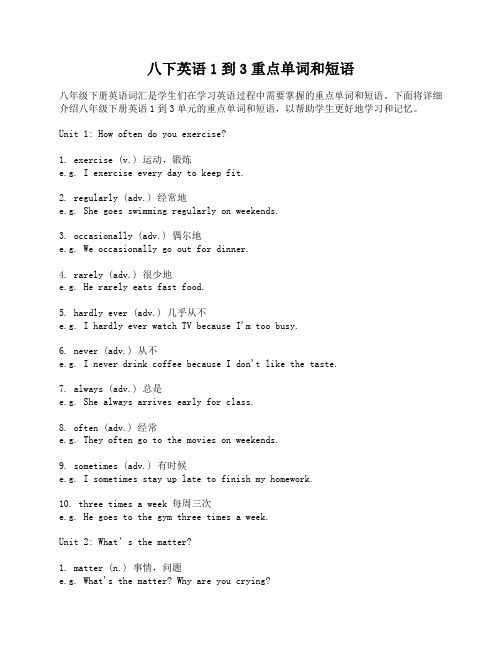
八下英语1到3重点单词和短语八年级下册英语词汇是学生们在学习英语过程中需要掌握的重点单词和短语。
下面将详细介绍八年级下册英语1到3单元的重点单词和短语,以帮助学生更好地学习和记忆。
Unit 1: How often do you exercise?1. exercise (v.) 运动,锻炼e.g. I exercise every day to keep fit.2. regularly (adv.) 经常地e.g. She goes swimming regularly on weekends.3. occasionally (adv.) 偶尔地e.g. We occasionally go out for dinner.4. rarely (adv.) 很少地e.g. He rarely eats fast food.5. hardly ever (adv.) 几乎从不e.g. I hardly ever watch TV because I'm too busy.6. never (adv.) 从不e.g. I never drink coffee because I don't like the taste.7. always (adv.) 总是e.g. She always arrives early for class.8. often (adv.) 经常e.g. They often go to the movies on weekends.9. sometimes (adv.) 有时候e.g. I sometimes stay up late to finish my homework.10. three times a week 每周三次e.g. He goes to the gym three times a week.Unit 2: What’s the matter?1. matter (n.) 事情,问题e.g. What's the matter? Why are you crying?2. feel (v.) 感觉e.g. I feel tired after a long day at work.3. headache (n.) 头痛e.g. I have a terrible headache.4. stomachache (n.) 胃痛e.g. She couldn't eat because of the stomachache.5. toothache (n.) 牙痛e.g. He went to the dentist because of a toothache.6. sore throat (n.) 喉咙痛e.g. I can't speak because I have a sore throat.7. runny nose (n.) 流鼻涕e.g. My sister has a runny nose and can't stop sneezing.8. cough (v.) 咳嗽e.g. He has been coughing all night.9. sneeze (v.) 打喷嚏e.g. I always sneeze when I'm allergic to something.10. take medicine 吃药e.g. You should take some medicine for the pain.Unit 3: What are you doing for vacation?1. vacation (n.) 假期,度假e.g. I'm going on vacation to the beach next week.2. trip (n.) 旅行e.g. We went on a trip to Paris last summer.3. camp (n.) 露营e.g. I went to summer camp and had a great time.4. stay (v.) 停留,逗留e.g. We stayed in a hotel during our vacation.5. visit (v.) 参观,访问e.g. They visited the Great Wall during their trip to China.6. hike (v.) 徒步旅行,远足e.g. We hiked in the mountains for the whole day.7. swim (v.) 游泳e.g. She loves to swim in the ocean.8. explore (v.) 探索,寻找e.g. We explored the ancient ruins and learned a lot.9. relax (v.) 放松e.g. I like to relax on the beach and read a book.10. have fun 玩得开心e.g. We had a lot of fun at the amusement park.Unit 4: What’s your favorite sport?1. sport (n.) 运动e.g. Basketball is my favorite sport.2. basketball (n.) 篮球e.g. The NBA is the highest professional basketball league in the world.3. soccer (n.) 足球e.g. The World Cup is the most watched sports event in the world.4. tennis (n.) 网球e.g. Roger Federer is one of the greatest tennis players of all time.5. volleyball (n.) 排球e.g. The USA women's volleyball team is a powerhouse in the sport.6. running (n.) 跑步e.g. The marathon is one of the longest running races.7. cycling (n.) 骑自行车e.g. The Tour de France is the most famous cycling race.8. swimming (n.) 游泳e.g. Michael Phelps is the most decorated Olympian in history.9. skiing (n.) 滑雪e.g. The Winter Olympics showcase the best in skiing and other winter sports.10. surfing (n.) 冲浪e.g. Surfing is a popular sport on the beaches of Hawaii.Unit 5: What are you going to be when you grow up?1. doctor (n.) 医生e.g. My dream is to become a doctor and help people.2. teacher (n.) 老师e.g. Teachers play a crucial role in shaping the minds of young students.3. engineer (n.) 工程师e.g. Engineers design and build the structures that make modern life possible.4. lawyer (n.) 律师e.g. Lawyers work to ensure justice and protect the rights of their clients.5. artist (n.) 艺术家e.g. Artists use their creativity to express themselves through various forms of art.6. musician (n.) 音乐家e.g. Musicians create and perform music that can touch the hearts of many.7. scientist (n.) 科学家e.g. Scientists study the world around us to uncover new knowledge and solve problems.8. astronaut (n.) 宇航员e.g. Astronauts travel into space to conduct research and explore the final frontier.9. firefighter (n.) 消防员e.g. Firefighters risk their lives to save others and protect property from fire.10. police officer (n.) 警察e.g. Police officers work to maintain public safety and enforce laws.以上是八年级下册英语1到3单元的重点单词和短语。
(完整word版)最新人教版八下英语1-6单元讲义

八年级英语下册知识点精讲、练(unit1—6)崔老师关于学生如何学好英语的几点建议:一、保持对英语的浓厚兴趣,因为兴趣是最好的老师.二、在学习过程中善于总结并践行适合自己的学习方法.英语听、说、读、写四大技能齐头并进方可逐渐领会该语言的灵魂与美感.初中生书写能力的提高从记忆单词开始,如下几种方法可供借鉴:由音及形法(根据读音是记单词)、分类法(分门别类识记)、联想法(由一个单词联想起众多形似、音近的单词)三、多种感官参与到英语学习中,加深记忆。
多听多说,提高听说能力。
四、坚持用英语写日记,持之以恒的将所学英语运用于生活之中.2016年三月份整理Unit 1 What’s the matter?一、基础知识1。
What’ s the matter? 怎么啦?出什么事情了?【解析】matter/ ’ mætə(r))/n。
问题;事情What’ s the matter with you?= What’s the trouble with you? = What’ s wrong with you? 你怎么了?【注】:matter 和trouble 为名词,其前可加the 或形容词性物主代词,wrong 是adj。
不能加the【用法】用于询问某人有什么病或某人遇到什么麻烦、问题其后跟询问对象时,与介词with连用。
即:What’s the matter with sb.?= What's your trouble?= What’s up?= What happens to sb.?—What’s the matter with you ?— I have a bad cold.2。
I had a cold.我感冒了。
have a cold=catch a cold=have the flu感冒have a fever 发烧have a cough咳嗽have a stomachache胃疼,肚子疼have a toothache牙疼have a headache 头疼3。
(完整word版)人教版八年级(下)新目标英语重点短语及句型总汇
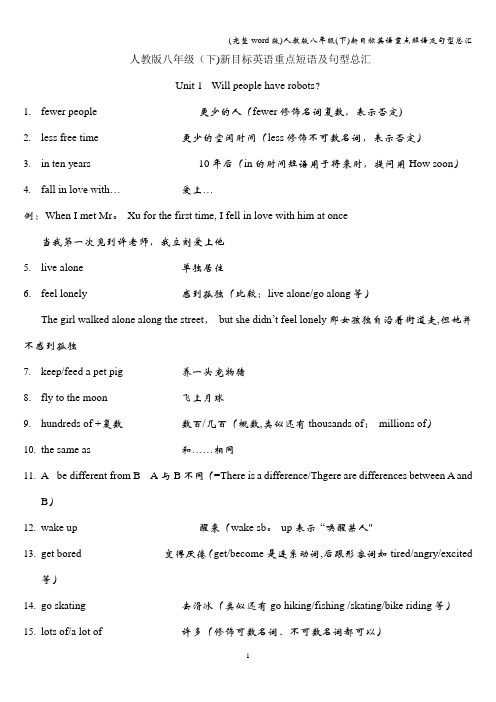
人教版八年级(下)新目标英语重点短语及句型总汇Unit 1 Will people have robots?1.fewer people 更少的人(fewer修饰名词复数,表示否定)2.less free time 更少的空闲时间(less修饰不可数名词,表示否定)3.in ten years 10年后(in的时间短语用于将来时,提问用How soon)4.fall in love with…爱上…例:When I met Mr。
Xu for the first time, I fell in love with him at once当我第一次见到许老师,我立刻爱上他5.live alone 单独居住6.feel lonely 感到孤独(比较:live alone/go along等)The girl walked alone along the street,but she didn’t feel lonely那女孩独自沿着街道走,但她并不感到孤独7.keep/feed a pet pig 养一头宠物猪8.fly to the moon 飞上月球9.hundreds of +复数数百/几百(概数,类似还有thousands of;millions of)10.the same as 和……相同11.A be different from B A与B不同(=There is a difference/Thgere are differences between A andB)12.wake up 醒来(wake sb。
up表示“唤醒某人"13.get bored 变得厌倦(get/become是连系动词,后跟形容词如tired/angry/excited等)14.go skating 去滑冰(类似还有go hiking/fishing /skating/bike riding等)15.lots of/a lot of 许多(修饰可数名词、不可数名词都可以)16.at the weekends 在周末17.study at home on computers 在家通过电脑学习18.agree with sb. 同意某人(的意见)19.I don’t agree。
(完整word版)八年级英语下册第一单元重点单词汇总表(人教版),推荐文档
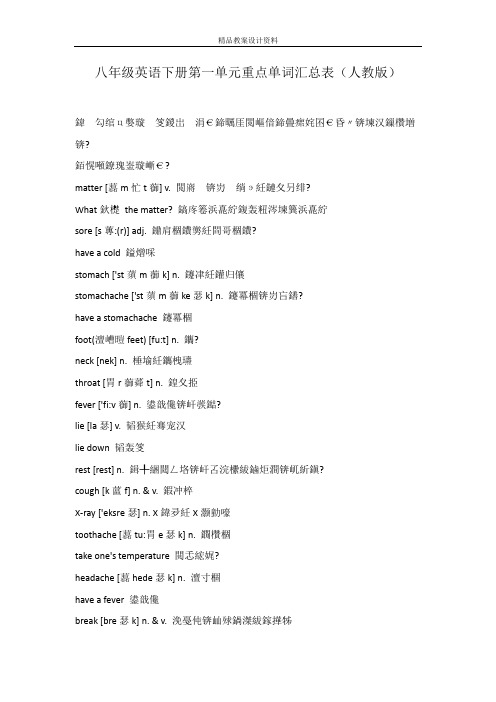
八年级英语下册第一单元重点单词汇总表(人教版)鍏勾绾ц嫳璇笅鍐岀涓€鍗曞厓閲嶇偣鍗曡瘝姹囨€昏〃锛堜汉鏁欑増锛?銆愰噸鐐瑰崟璇嶃€?matter [藞m忙t蓹] v. 閲嶈锛岃绱э紝鏈夊叧绯?What鈥檚the matter? 鎬庝箞浜嗭紵鍑轰粈涔堜簨浜嗭紵sore [s蓴:(r)] adj. 鐤肩棝鐨勶紝閰哥棝鐨?have a cold 鎰熷啋stomach ['st蕦m蓹k] n. 鑳冿紝鑵归儴stomachache ['st蕦m蓹ke瑟k] n. 鑳冪棝锛岃吂鐥?have a stomachache 鑳冪棝foot(澶嶆暟feet) [fu:t] n. 鑴?neck [nek] n. 棰堬紝鑴栧瓙throat [胃r蓹蕣t] n. 鍠夊挋fever ['fi:v蓹] n. 鍙戠儳锛屽彂鐑?lie [la瑟] v. 韬猴紝骞宠汉lie down 韬轰笅rest [rest] n. 鍓╀綑閮ㄥ垎锛屽叾浣欙紱鏀炬澗锛屼紤鎭?cough [k蓲f] n. & v. 鍜冲椊X-ray ['eksre瑟] n. X鍏夛紝X灏勭嚎toothache [藞tu:胃e瑟k] n. 鐗欑棝take one's temperature 閲忎綋娓?headache [藞hede瑟k] n. 澶寸棝have a fever 鍙戠儳break [bre瑟k] n. & v. 浼戞伅锛屾殏鍋滐紱鎵撶牬take breaks (take a break锛?浼戞伅hurt [h蓹:t] v. 浼ゅ锛屾崯瀹筹紝浣垮彈浼?passenger ['p忙s瑟nd蕭蓹] n. 涔樺锛屾梾瀹?off [蓲f] adv. prep. 绂诲紑锛堟煇澶勶級锛涗粠鈥﹀幓鎺?get off 涓嬭溅to one's surprise 浣库€︽儕璁讹紝鍑轰箮鈥︽剰鏂?onto [藞蓲nt蓹] prep. 鍚戯紝鏈?trouble [藞tr蕦bl] n. 楹荤儲锛岀儲鎵帮紝闂hit [hit] n. & v. 纰版挒锛屾墦锛屾墦鍑?right away 绔嬪嵆锛岄┈涓?get into 闄峰叆锛屽弬涓?herself [h蓹:藞self] pron. 濂硅嚜宸憋紝濂规湰韬紙she鐨勫弽韬唬璇嶏級bandage ['b忙nd瑟d蕭] n. & v. 缁峰甫锛涚敤缁峰甫鍖呮墡sick [s瑟k] adj. 鎮g梾鐨勶紝涓嶉€傜殑knee [ni:] n. 鑶濈洊nosebleed [藞n蓹蕣zbli:d] n. 榧诲嚭琛€breathe [bri:冒] v. 鍛煎惛sunburned [藞s蕦nb蓽:nd] adj. 鏅掍激鐨?ourselves [锟斤拷:藞selvz] pron. 鎴戜滑鑷繁锛坵e鐨勫弽韬唬璇嶏級climber [藞kla瑟m蓹(r)] n. 鐧诲北鑰?be used to 涔犳儻浜庘€?閫傚簲浜庘€?risk [r瑟sk] n. & v. 椋庨櫓锛屽嵄闄╋紱鍐掗櫓take risks (take a risk) 鍐掗櫓accident [藞忙ksid蓹nt] n. 鎰忓浜嬩欢锛涗簨鏁?situation [藢sitju藞ei蕛蓹n] n. 鐘跺喌锛屽舰寮忥紝鎯呭喌kg=kilogram [藞k瑟l蓹gr忙m] n. 鍏枻锛屽崈鍏?rock [r蓴k] n. 宀╃煶run out (of) 鐢ㄥ敖锛岃€楀敖knife [naif] n. 鍒€锛岄鍒€cut off 鍒囬櫎blood [bl蕦d] n. 琛€mean [mi:n] v. 鎰忓懗鐫€锛屾剰鎬濇槸锛屾剰娆? get out of 绂诲紑锛屼粠鈥?鍑烘潵importance [瑟m藞p蓴:tns] n. 閲嶈鎬?decision [d瑟's瑟蕭n] n. 鍐冲績锛屽喅瀹氾紝鎶夋嫨control [k蓹n'tr蓹蕣l] v. 鎺у埗锛屾敮閰嶏紝鎿嶇旱be in control of 鎺岀锛岀鐞?spirit ['sp瑟r瑟t] n. 鍕囨皵锛屾剰蹇?death [de胃] n. 姝讳骸give up 鏀惧純nurse [n蓹:s] n. 鎶ゅ+Judy鏈辫开锛堝コ鍚嶏級ancy鍗楀笇锛堝コ鍚嶏級Mandy鏇艰开锛堝コ鍚嶏級Aron Ralston闃夸鸡銉荤綏灏旀柉椤?Utah鐘逛粬宸烇紙缇庡浗锛?。
人教版八年级下册英语重点短语(全)

人教版八年级下册英语重点短语(全)Unit 1 What’s the matter?In this unit。
we will learn some common phrases related to health issues。
These phrases will help you communicate better when you or someone you know is not feeling well.1."Have a fever" means that your body temperature is higher than normal。
If you have a fever。
you may feel hot and sweaty。
and you may also have other symptoms like a headache or body aches.2."Have a cough" means that you are experiencing a reflex n that helps to clear your airways。
Coughing can be caused by a variety of factors。
including a cold。
flu。
or allergies.3."Have a toothache" means that you are experiencing pain in your teeth or gums。
Toothaches can be caused by cavities。
gum disease。
or other dental problems.4."Talk too much" means that you are speaking more than necessary。
人教版英语八年级下册所有短语-整理

人教版英语八年级下册所有短语-整理Unit 1: Teenagers should be allowed to choose their own clothes1. be allowed to 允许2. choose their own clothes 选择自己的衣服3. dress code 服装要求4. make decisions 做决定5. express themselves 表达自己6. show individuality 展示个性7. follow the rules 遵守规定8. a strict dress code 严格的着装规定9. a positive impression 一个积极的印象10. fit in 适应Unit 2: What should I do?1. ask for help 寻求帮助2. give advice 给予建议3. make a decision 做决定4. solve problems 解决问题5. deal with 处理6. a tough situation 艰难的情况7. face challenges 面对挑战8. handle stress 处理压力10. cope with stress 应对压力Unit 3: Sports in the United Kingdom1. take part in 参加2. a national sport 国家运动3. a professional athlete 一名职业运动员4. sports facilities 体育设施6. a sporting event 体育赛事7. be good at 擅长8. physical activity 体育活动9. team sports 球类运动10. individual sports 个人运动Unit 4: It's raining!1. changeable weather 多变的天气2. outdoor activities 户外活动3. stay indoors 呆在室内4. a raincoat 雨衣5. carry an umbrella 携带伞6. put on warm clothes 穿上暖和的衣服7. enjoy the sunshine 享受阳光8. go hiking 去远足9. have a picnic 野餐10. play sports 进行体育运动Unit 5: Music1. play a musical instrument 弹奏乐器2. sing in a choir 参加合唱团3. listen to music 听音乐4. musical tastes 音乐品味5. a music lover 音乐爱好者6. express emotions 表达情感7. a talented musician 一位有才华的音乐家9. attend music lessons 上音乐课10. perform on stage 在舞台上表演...(继续整理其他单元短语)...以上为人教版英语八年级下册所有单元的短语整理,希望对你的学习有所帮助!。
新版人教版八年级下册英语各单元单词及重点短语句型
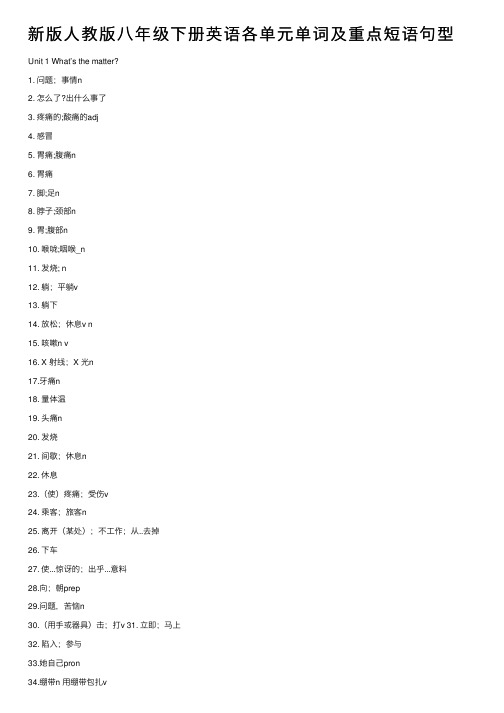
新版⼈教版⼋年级下册英语各单元单词及重点短语句型Unit 1 What’s the matter?1. 问题;事情n2. 怎么了?出什么事了3. 疼痛的;酸痛的adj4. 感冒5. 胃痛;腹痛n6. 胃痛7. 脚;⾜n8. 脖⼦;颈部n9. 胃;腹部n10. 喉咙;咽喉_n11. 发烧; n12. 躺;平躺v13. 躺下14. 放松;休息v n15. 咳嗽n v16. X 射线;X 光n17.⽛痛n18. 量体温19. 头痛n20. 发烧21. 间歇;休息n22. 休息23.(使)疼痛;受伤v24. 乘客;旅客n25. 离开(某处);不⼯作;从..去掉26. 下车27. 使...惊讶的;出乎...意料28.向;朝prep29.问题,苦恼n30.(⽤⼿或器具)击;打v 31. ⽴即;马上32. 陷⼊;参与35. ⽣病的;有病的adj36. 膝;膝盖n37. ⿐出⾎n38. 呼吸v39. 晒伤的adj40. 我们⾃⼰pron41.登⼭者;攀登者n42.习惯于...;适应于...43. 危险;风险;冒险n v44. 冒险45. 交通事故;意外遭遇n46. 情况;状况n47. 千克;公⽄n48. 岩⽯n49. ⽤尽;耗尽50. ⼑n51. 切除52. ⾎n53. 意思是;打算;意欲v54. 离开;从...出来55. 重要性;重要n56. 决定;抉择n57. 限制;约束;管理n v58. 掌管;管理59. 勇⽓;意志n60 死;死亡n61. 放弃62. 护⼠n⼆、重点短语1. have a fever2. have a cough3. have a toothache4. talk too much5. drink enough water7. have a stomachache8. have a sore back9. have a sore throat10. lie down and rest11. hot tea w ith honey12. see a dentist13. get an X-ray14. take one ’ s temperature15. put some medicine on sth16. feel very hot17. sound like18. all weekend19. in the same way20. go to a doctor21. go along22. on the side of the road23. shout for help24. without th inking twice25. get off26. have a heart problem 27. to one ’ s surprise28. thanks to29. in time30. save a life31. get into trouble32. right away33. because of34. get out of35. hurt oneself36. put a bandage on sth.37. fall down38. feel sick39. have a nosebleed40. cut his knee41. put her head back43. mountain climbing44. be used to doing sth.45. run out (of)46. so. . . that47. be in control of48. in a difficult situation59. keep on doing sth.60. make a decision51. take risks52. give up三、重点句型1. What ’s the mat(tw er i th ---)? = What ’s the troub(lw e ith ---)? = What’ s wrong(with ---)? = What ’-s-- problem?2. What should she do?Should I take my temperature?①You should lie down and rest.② You shouldn ’t go out at night.3. Do you think it comes from a newspaper or a book?4. I think I sat in the same way for too long without moving.5. She said that the man had a heart problem and should go to the hospital.Unit 2 I ’l l help to clean up the city parks1. 打扫或清除⼲净2. 欢呼;喝彩v3. 使变得⾼兴;振奋起来4. 分发;散发5. 义务做;⾃愿做v ⾃愿者n6. 想出;提出(主意、计划、回答等)7. 推迟8. 标志;信号n9. 通知、通告n 注意到;意识到v10. 分发11. 打电话给某⼈;征召12.曾经...;过去...13 孤独的;寂寞的adj15. ⼏个;数个;⼀些pron16. 强烈的;强壮的adj17. 感觉;感触n18. 满⾜;满意n19. ⾼兴;愉快n20. 物主;主⼈n21. 参加...选拔;试⽤22. 尤指长途旅⾏;⾏程n23. 募集;征集v 24. 独⾃;单独adv25. 修理;修补v26. 修理;安装v27. 修理;装饰28. 赠送;捐赠29.(外貌或⾏为)像30. 破损的;残缺的adj31. 车轮;轮⼦n32 信;函n33 ⼥⼠;⼩姐n34 建起;设⽴35 丧失能⼒的;有残疾的adj36 影响;有作⽤37 瞎的;失明的adj38 聋的adj39 想象;设想v40 困难;难题n41 开;打开v42 门n43 拿;提;扛v44 训练;培训n45 仁慈;善良n46 聪明的;聪颖的adj47 理解;领会v48 变化;改变v n49 兴趣;关注n 使感兴趣使关注v1. Clean-Up Day2. an old people ’s home3. help out with sth.4. used to5. care for6. the look of joy7. at the age of8clean up9. cheer up10. give out11. come up w ith12. make a plan13. make some notices14. try out15. work for16. put up17. hand out⼆、重点句型1. The boy could give out food at the food bank.这个男孩可以在⾷品救济站分发⾷物。
(完整版)人教版八年级英语下册Unit1知识点讲解(可编辑修改word版)

Unit 1 重点知识讲解Grammar一、情态动词(Modal Verbs)情态动词should 意为“应该,应当”,必须和后面的动词原形一起构成谓语,没有人称和数的变化。
用以表达职责和义务、提出劝告,而且表述的是自己的主观看法。
1.should 的句式结构2.s hould 的用法喜或在说话人看来是不可思议的。
二、其他表示建议的句型表示反射或强调的代词叫做反身代词。
反身代词是由第一人称、第二人称形容词性物主代词或第三人称代词的宾格形式,词尾加self 或selves 组成。
反身代词可译“本人”、“本身”,为加强语气,也常翻译为“亲自”、“自己”。
不定人称代词one ---- oneself.1、反身代词的分类2、反身代词的用法单词的用法Section A1.What’s the matter?怎么了?该句常用询问某人患了何种疾病或遇到了什么麻烦,其后用with 引出对象。
1). What’s the matter with sb.?=what’s wrong with sb.?=what’s the trouble/problem with sb.?=what’s one’s trouble/problem?e.g. What’s the matter with Tom?=what’s with Tom?=What’s the with Tom?=What’s Tom’s?2). matter, 名词,“问题,事情”e.g. We have important (matter) to discuss.我们有些重要的问题要讨论。
3). 动词,“要紧,关系重大”e.g. It dosen’t that you came late.2.I have a cold.我感冒了。
1).have/get/catch a cold “感冒,着凉”The old man a cold yesterday.那位老人昨天感冒了。
(完整版)人教版八年级下册英语各单元重点短语

人教八下重要短语、句子汇总Unit 1 What’s the matter?一、重点短语1. have a fever 发烧2. have a cough 咳嗽3. have a toothache 牙疼4. talk too much 说得太多5. drink enough water 喝足够的水6. have a cold 受凉;感冒7. have a stomachache 胃疼8. have a sore back 背疼9. have a sore throat 喉咙痛10. lie down and rest 躺下来休息11. so that 以便12. see a dentist 看牙医13. get an X-ray 拍X 光片14. take one’s temperature 量体温15. give up 放弃16. keep on doing sth. 坚持做某事17. sound like 听起来像18. run out (of) 用完; 用尽19. in the same way 以同样的方式20. be used to doing sth. 习惯做某事21. go along 沿着……走23. make a decision 做出决定24. without thinking twice 没有多想25. get off 下车26. have a heart problem 有心脏病27. to one’s surprise 使....... 惊京讶的28. thanks to 多亏了;由于29. in time 及时30. save a life 挽救生命31. get into trouble 造成麻烦32. right away 立刻;马上33. because of 由于34. get out of 离开;从……出萍35. hurt oneself 受伤36. take risks 冒险37. fall down 摔倒38. feel sick 感到恶心39. have a nosebleed 流鼻血40. so. . . that 如此……以至于…41. have problems breathing 呼吸困难42. be in control of 掌管;管理二、重点句型1. What’s the matter with you? / What’s wrong with you? 你怎么了?2. W hat should she do? 她该怎么办呢?→主语+ should/shouldn’t + 动词原形. ..①You should lie down and rest. 你应该躺下休息一会儿。
人教版八年级英语下册复习知识点

人教版八年级英语下册复习知识点人教版八年级下册英语知识篇一【重点短语】1.go out for dinner 出去吃饭2.stay out late 在外面待到很晚3.go to the movies 去看电影4.get a ride 搭车5.work on 从事6.finish doing sth. 完成做某事7.clean and tidy 干净整洁的8.do the dishes 洗餐具9.take out the rubbish 倒垃圾10.fold your/the clothes 叠衣服11.sweep the floor 扫地12.make your/the bed 整理床铺13.clean the livng room 打扫客厅problem 没问题15.wele sb. 欢迎某人home from school/work放学/下班回家17.throw down 扔下18.sit down 坐下over 过来20.take sb. for a walk 带某人去散步21.all the time 一直;总是22.all day/evening 整曰/夜23.do housework 做家务24.shout back 大声回应25.walk away 走开26.share the housework 分担家务27.a fortable home 一个舒适的家28.in surprise 惊讶地something to drink 拿点喝的东西30.watch one show 观看一个节目31.hang out 闲逛32.pass sb. sth. 把某物传给某人33.lend sb. sth. 把某物借给某人sth. wet 使某物弄湿35、 hate to do sth. 讨厌做某事36.do chores 做杂务37.help sb. (to ) d o /with sth?帮助某人干某事38.bring a tent带顶帐篷来39.buy some snacks买些小吃to the store去商店41.invite sb. to a party邀请某人参加聚会42.make sb. do sth. 使某人做某事stress足够的压力44.a waste of time浪费时间45.in order to为了good grades取得好成绩47.mind doing sth. 介意做某事48.depend on依赖;依靠49.develop children ’ s independence发展孩子的独立性50.look after/take care of 照顾;照看51.do one’ s part in (doing ) sth. 做某人分内的事【重点句型】1.Could you please clean your room? 你能打扫一下你的房间吗?2、 I have to do some work. 我必须干些活。
完整word版,人教版八年级英语下册各知识点归纳总结
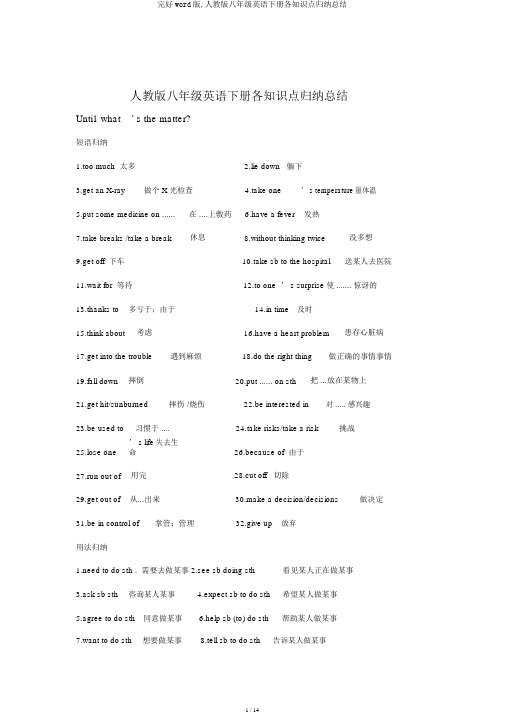
人教版八年级英语下册各知识点归纳总结Unti1 what’ s the matter?短语归纳1.too much 太多2.lie down 躺下3.get an X-ray做个 X 光检查4.take one’ s temperature量体温5.put some medicine on ......在 ....上敷药6.have a fever发热7.take breaks /take a break休息8.without thinking twice没多想9.get off 下车10.take sb to the hospital送某人去医院11.wait for 等待12.to one’ s surprise使 ....... 惊讶的13.thanks to多亏于;由于14.in time及时15.think about考虑16.have a heart problem患存心脏病17.get into the trouble遇到麻烦18.do the right thing做正确的事情事情19.fall down摔倒20.put ...... on sth把 ...放在某物上21.get hit/sunburned摔伤 /烧伤22.be interested in对 ..... 感兴趣23.be used to习惯于 ....24.take risks/take a risk挑战25.lose one ’ s life失去生命26.because of 由于27.run out of用完28.cut off 切除29.get out of从...出来30.make a decision/decisions做决定31.be in control of掌管;管理32.give up放弃用法归纳1.need to do sth . 需要去做某事2.see sb doing sth看见某人正在做某事3.ask sb sth咨询某人某事4.expect sb to do sth希望某人做某事5.agree to do sth同意做某事6.help sb (to) do sth帮助某人做某事7.want to do sth想要做某事8.tell sb to do sth告诉某人做某事9.have problems(in) doing sth做某事有困难e sth to do sth用某物去做某事习惯于做某事12.seem to do sth忧如做某事13.keep on doing sth连续做某事14.mind doing sth介意做某事语法点1.咨询某人的健康问题及遇到麻烦的表达方法2.神情动词should的用法3.不定代词的用法精巧解读1. What’ s the matter (with you)?怎么了?出什么事了?What’s the trouble/ the problem / wrong with sb./ sth.?2. I had a cold.我感冒了。
- 1、下载文档前请自行甄别文档内容的完整性,平台不提供额外的编辑、内容补充、找答案等附加服务。
- 2、"仅部分预览"的文档,不可在线预览部分如存在完整性等问题,可反馈申请退款(可完整预览的文档不适用该条件!)。
- 3、如文档侵犯您的权益,请联系客服反馈,我们会尽快为您处理(人工客服工作时间:9:00-18:30)。
人教八下重要短、句子Unit 1 What ’ s the matter?一、重点短1. have a fever23. make a decision做出决定2. have a cough咳嗽24. without thinking twice 没有多想3. have a toothache牙疼25. get off 下4. talk too much 得太多26. have a heart problem有心病5. drink enough water 喝足的水27. to one’ s surprise使....... 惊京的6. have a cold受凉。
感冒28. thanks to 多了;由于7. have a stomachache胃疼29. in time 及8. have a sore back背疼30. save a life挽救生命9. have a sore throat喉痛31. get into trouble 造成麻10. lie down and rest躺下来休息32. right away 立刻;上11. so that以便33. because of由于12. see a dentist看牙医34. get out of 离开。
从⋯⋯出萍13. get an X-ray 拍 X 光片35. hurt oneself 受14. take one ’ s temperature量体温36. take risks 冒15. give up 放弃37. fall down 摔倒16. keep on doing sth. 持做某事38. feel sick 感到心17. sound like 听起来像39. have a nosebleed流鼻血18. run out (of) 用完。
用尽40. so. . . that如此⋯⋯以至于⋯19. in the same way以同的方式41. have problems breathing呼吸困20. be used to doing sth. 做某事42. be in control of掌管。
管理21.go along 沿着⋯⋯走二、重点句型1.What’ s the matter with you?/What’ s wrong with you?你怎么了?2.W hat should she do?她怎么呢?→主 + should/shouldn’ t +原形 . ..①You should lie down and rest你.躺下休息一会儿。
②You shouldn ’t ’ t go out at night你晚.上不出去。
3.Do you think it comes from a newspaper or abook?你它是来自是呢?4.I think I sat in the same way for too long withoutmoving.我想我以同的姿一不地坐得太久了。
5.She said that the man had a heart problem andshould go to thehospital Unit 2 I ’ ll help to clean up the city parks.一、重1.Clean-Up Day 清日2.an old people ’ s home养老院3.help out with sth. 帮助解决困ed to曾⋯⋯;去5.care for 关心。
照点短6.the look of joy 快的表情7.at the age of在......8.clean up 打 (或清除 )干9.cheer up (使 )得更高。
振雀10.give out 分。
散11. come up with 想出;提出12. make a plan制划13. make some notices做些公告牌14. try out 用。
行15. work for⋯工作;⋯ .效力16. put up 建造。
起。
17. hand out分。
散。
18. call up 打。
召集19. put off 推。
延20. for example 比如;例如21. raise money筹。
募捐22. take after 和......相像。
像23. give away 送。
捐24. fix up 修理。
修。
解决25. be similar to 和⋯⋯相似26. set up建立。
立27. disabled people残疾人28. make a difference影响。
有作用29. be able to能30.after-school reading program外工程二、重点句型1.The boy could give out food at the food bank.个男孩可以在食品救站分食物。
2.Clean-Up Day is only two weeks from now. 清日离在两周的。
3.He volunteers at an animal hospital every Saturday morning.每周六上午,他都在一 '家物医院当志愿者。
st year, she decidedto try out for a volunteer after-school reading program.去年,她决定去参加一个外工程的志愿者的拔。
5.I want to put off my plan to work in an animal hospital until next summer.我想把我在物医院工作的划推到明年夏天。
7.Most people today are only worried about getting good jobs to make lots of money.在的大部分人只是找一份能多的好工作而着急。
8.You helped to make it possible for meto have Lucky.在你的帮助下,我才有可能有“幸运儿”。
Unit 3 Could you please clean your room?一、重点短1. go out for dinner 出去吃16. come home from work下班回家2. stay out late 在外面待到很晚17. throw down 扔下3. go to the movies去看影18. awaste of time浪4. get a ride 搭19. make sb. do sth.使某人做某事5. work on 从事20. take sb. for a walk 某人去散步6. finish doing sth. 完成做某事21. all the time 一直。
是7. depend on依。
依靠22. all day/evening 整曰 /夜8. do the dishes洗餐具23. do housework做家9. take out the rubbish倒垃圾24. shout back大声回10. fold your/the clothes 叠衣服25. enough stress足的力11. sweep the floor 地26. share the housework分担家12. make your/the bed整理床27.look after/take care of 照;照看14. no problem 没28. in surprise 惊地15. welcome sb. 迎某人29. get something to drink 拿点喝的西30. in order to 了31. hang out逛32.do one’ s part in (doin g ) sth.做某人分内的事33. lend sb. sth.把某物借某人34. get good grades取得好成35. hate to do sth.做某事36. do chores做37. help sb. do /with sth 帮助某人干某事38. mind doing sth. 介意做某事39. buy some snacks些小吃40. go to the store去商店41. invite sb. to a party邀某人参加聚会二、重点句型1.Could you please⋯..do sth/Could.? you please clean your room?2.I have to do some work.我必干些活。
3.Could I+ do sth. ?→ Could I use your computer?4.She won ’ t be happy if she sees th is mess.如果她看到乱七八糟的,她会不高的。
5.For one week, she did not do any housework and neither did I.整整一周,她什么家活都不干了,我也一。
6.My mom came over as soon as I sat down in front of the T V .我一在机前坐下,我就来了。
7.hate + ( to do/ doing) sth→. I hate to do chores.Unit 4 Why don’ t you talk to your parents?一、重点短1. have free time有空22. offer to do sth. 主提出做某事2. allow sb. to do sth. 允某人做某事23. so that以便3. hang out with sb. 和某人逛24. mind sb. doing sth.介意某人做某事4. after-school classes外活25. all the time 一直5. get into a fight w ith sb. 和某人吵架/打架26. in future 今后6. until midnight 直到半夜27. make sb. angry使某人生气7. talk to sb. 和某人交28. worry about sth. 担心某事8. too many太多29. copy one’ s homework抄袭某人的作业9. study too much学得多30. be oneself做自己10. get enough sleep有足的睡眠31. family members11. write sb. a letter某人写信32. spend time alone独自消磨光12. call sb. up打某人33. give sb. pressure某人施13. surprise sb.令某人惊34. have a fight w ith sb. 和某人吵架14. look through 翻看35. compete w ith sb.和某人争15. be angry with sb. 生某人的气36. free time activities 余活16. a big deal重要的事37. get better grades取得更好的成17. work out 成功地展。
